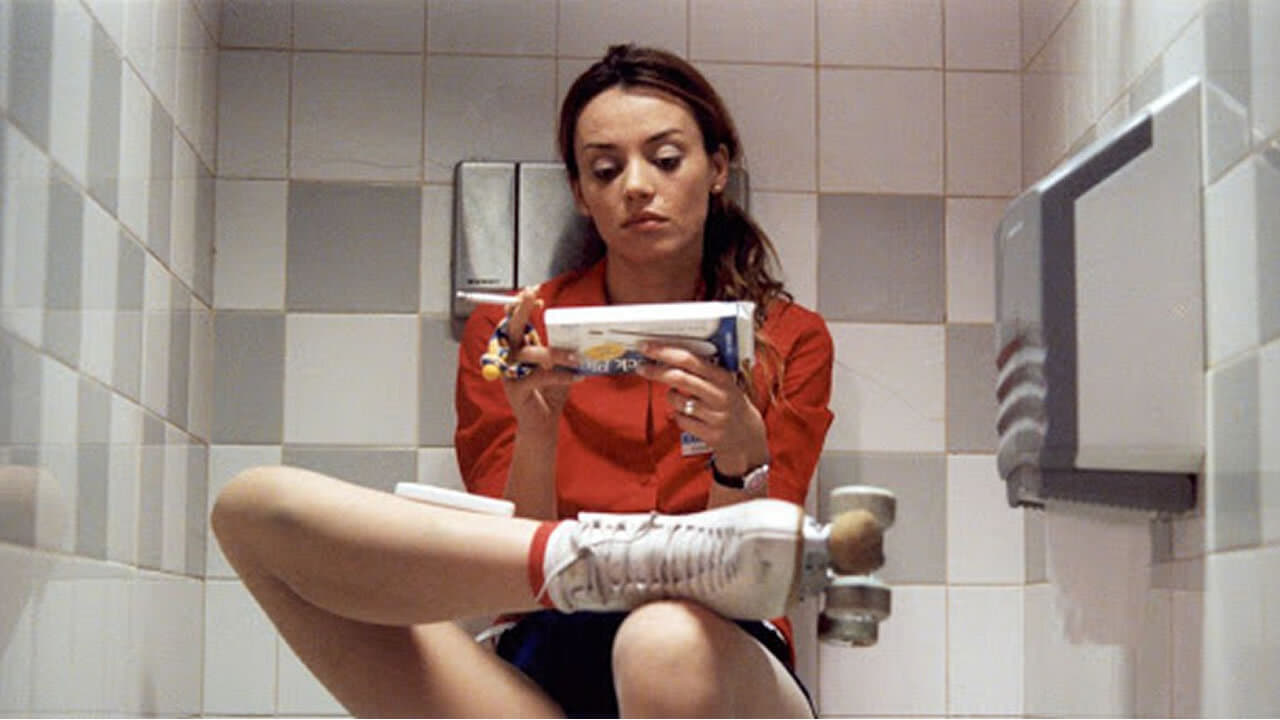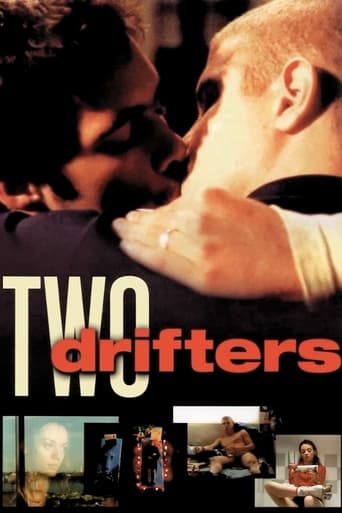

Strong and Moving!
... View MoreThis is a must-see and one of the best documentaries - and films - of this year.
... View MoreBy the time the dramatic fireworks start popping off, each one feels earned.
... View MoreThis is a small, humorous movie in some ways, but it has a huge heart. What a nice experience.
... View MoreThe grimness of the pre-credit sequence of Joao Pedro Rodrigues' "Two Drifters" isn't maintained though what follows is hardly a barrel of laughs. This is a film about people who are emotionally damaged and who are overwhelmed by grief. Odete, (Ana Cristina De Oliveira), is the beautiful but lonely girl who works in a supermarket and longs to have a baby. Rui, (Nuno Gil), is the young gay man she meets at the wake of his lover, Pedro, and who holds himself responsible for Pedro's death and nothing is quite what it appears to be on the surface.For example, Odete is far from a conventional heroine. Her neuroses, indeed you might even say her madness, doesn't make her particularly sympathetic and her relationship with Pedro is never really explained. Rui, on the other hand, despite all his guilt, is the more empathetic of the two characters and it is he, rather than Odete, we root for.Because of the darkness of the subject matter this isn't an easy film to like but Rodrigues handles the material beautifully and all the performances are first-rate. It never really saw the light of day and has largely disappeared and while it strictly doesn't fall into the category of New Queer Cinema it is, nevertheless, a welcome addition to what I would consider 'gay-themed' cinema.
... View MoreI just cannot find the right words to describe how much "Odete/Two Drifters" suffers from having the writer as the director of the film. Perhaps another director or an editor could have straightened out this nonsense and made it intriguing. As it is, this film should not have seen the light of day. I actually found it insulting that the writer/director served up this trash with a straight face and expected the audience to applaud. The film simply lacks any cogent story beyond the initial tragedy. Once Odete enters the frame, the film slowly veers off the tracks of credibility until it is completely air-born. The film ends abruptly, as if slamming directly into the ground, with an ending so ridiculous that I actually felt slapped in the face. Plenty of movies have a gay man who meets a straight woman equipped with a "magic" vagina that he can't resist. It seems to be a film staple that gay men just haven't met the right woman. However, transcending that idiocy, this film ends by giving Odete an ethereal penis with which she expands her madness to include Rui. After this nugget of manure, I just cannot take anymore "straight women with gay men" lunacy. Really, it's enough.
... View MoreDirector João Pedro Rodrigues and writer Paulo Rebelo ('O Fantasma') collaborate again on this fascinating (if a bit frustrating) Portuguese film ODETE ('Two Drifters'). Together they have their own brand of surrealism and exploration of fantasies that seems to be developing into a smart new look for cinema. The very controversial 'O Fantasma' was dark and brooding, tearing open psyches like feral dogs along the slums of Portugal, whereas 'Two Drifters' is a work in the daylight that moves the concentration from men only to men and women - but the extremes of behavior are still in sharp focus.The film opens with a very tender moment between handsome student Pedro (João Carreira) and his working boyfriend Rui (Nuno Gil): it is their anniversary but their individual obligations prevent them from spending more than a hasty goodbye, exchanging rings, and off goes Pedro in his car only to be killed in a crash. Devastated, Rui attends to Pedro and then to the horror of sitting by his casket during the wake before the funeral.Flash into storyline two: the beautiful store skater Odete (Ana Cristina De Oliveira) lives with her lover Alberto (the hunky Carloto Cotta) but when she announces she would like to have a child, Alberto flees and Odete is left in depression over her plight. She just happens to be a neighbor of the recently dead Pedro and in her loneliness she attends Pedro's wake, follows the casket through the funeral and to the grave where she begins to obsess over the dead Pedro. She spends her time draped across his grave, fantasizes that she is pregnant by him and confronts Pedro's mother with the concept. She truly has pseudosiesis (false imagined hysterical pregnancy) and when it is an exposed condition she alters her appearance, cutting her hair and wearing Pedro's clothes and even convincing Pedro's mother to let her sleep in his bed. Ultimately Odete, now inhabiting the persona of Pedro, rejects Albert's return to her graces and instead enters into a bizarre arrangement with Rui.The actors are all physically beautiful people, superbly cast to fit the models of the personalities of the story, and they manage to make this rather incredible tale credible. The film is rich in symbolism and metaphors, among them the title of the English version 'Two Drifters' - a phrase taken form the favorite fantasy song 'Moon River' that is the theme of Pedro's and Rui's relationship. There are some distorted sexual scenes and innuendos that may be off-putting to some, but the inclusion works for the story. It is a tough little film but dazzling in its brave little way of taking chances, making us eager to see what João Pedro Rodrigues will do next! Grady Harp
... View MoreIt's clear that Portuguese gay director João Pedro Rodrigues, whose Two Drifters (Odete, 2005) recently came to this country, is the extreme example of something. Is he making "the artiest queer stroke movie of the year" as Dennis Lim said in The Voice of his first effort? Is he "the most exciting new voice in the world today" or "a major and audacious new talent" as David Fear and Nathan Lee, respectively, have just declared in print? Or are his films "silly and overwrought," "both grueling and dull," "preposterous," "arbitrary," "pointless," "insufferable," "sudsy" as several other critics have recently written? His new movie is highly allusive, and an admiring article* has listed his many presumable and declared influences, from Hitchcock to Fassbinder. But most of all he's just his own persistent, obsessive self, which is both his strength and his limitation. "Two Drifters" (using the English word) is what two young gay lovers have had engraved inside twin silver rings they exchange to commemorate a year together. One of them, Pedro (João Carreira) gets in his car, drives off, and is immediately in a fatal smash-up. A strange, tall girl named Odete (Cristina De Oliveira), who slept with the deceased, quickly develops an unhealthy obsession with him, which becomes the chief focus of the movie and which she continually dramatizes by throwing herself on his coffin and screaming and by humping his grave in the rain. She has a job at a supermarket that involves wearing roller skates. While she is acting out, drawing the sympathy of Pedro's mother, getting fired from the job, and developing a hysterical pregnancy, Pedro's lover, Rui (Nuno Gil) is imploding with ill-expressed grief that a Warhol-style steam bath blow job fails to assuage. The sequences show a strong visual sense. The framing is precise. David Fear feels that Douglas Sirk's "hyperventilating melodramas inform every frame of Rodrigues' irony-soaked opera." If so, the style that results is still even more remote from the period and mood of Sirk than Todd Haynes' overrated, anachronistic Far from Heaven, and if this movie's irony-soaked (and one would hope so), the humor is hard to grasp. Certainly it's rain-soaked too, and steeped alternately in bright sunlight and nighttime shadow. Since Odete, now equipped with an expensive pram, practically moves into Pedro's grave, and Rui is afraid to go there, they don't meet much at first except when Rui drags Odete off of Pedro's coffin at the time of the funeral. She's big and tall, but he's hunky, and so equal to the task. Eventually they do meet again at the grave, and now that Odete has begun to channel Pedro and wear his clothes and haircut, a strange reincarnation takes place. There's another man who's also had sex with Odete but she kicks him out. He seems to be involved for little reason other than one: he has a perfect body, which we get to see every inch of. Rodrigues' concern with the physical comes with an unwillingness to delve into the motivations or personalities or backgrounds of his characters. Rodrigues is stingy with dialogue. His earlier O Fantasma, an obsessive S&M tale involving an ultra-handsome but mentally unhealthy garbage collector, is almost wordless. Two Drifters relies on the beautiful framing of its images, and on the symbolic use of the sound of rain and wind as well as syrupy songs like Banjo Moon and Moon River and loops of Mancini. Maybe Sirk and Fassbinder are influences, as reviewers have suggested. But while extreme melodrama and gay concerns may link him with other directors of similar bent, Rodrigues' strength is that he's working on his own. He is true to his own peculiar obsessions and he lets nothing get in the way of following them through. Since he's working nearby, it might be worth considering that he's been affected by Almodóvar. There's something of the Spanish master in Odete's persistence, her willingness to assume a masculine role. The trouble is that Rodrigues' "elliptical cuts" not only interrupt the "transgressive trance" as Lim said of O Fantasma, but simply slow down the action, here as well. The director isn't good at pacing. The writer who said that when both lovers start getting suicidal you wish they'd hurry up with it was not far wrong. Watching Two Drifters is a claustrophobic experience, a challenging exercise in sitting still. But Fear and Lee aren't completely crazy. This filmmaker is worth following for his sense of craft and tradition and for the rigorous way he cleaves to his own concerns. *"Double 'O'Heaven: The Vertigo Pop and Phantom Desires of João Pedro Rodrigues" by Johnny Ray Houston in Cinemascope.
... View More